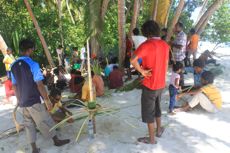While government officials flock to Addu for international convention SAARC and Male’ residents enjoy a calm holiday atmosphere, islands across the Maldives are welcoming family and friends home for Eid celebrations.
The island of Maalhos in Arif Atoll has been preparing since last week.
Male’-based residents who arrived last Thursday, November 3 spent the following day and evening preparing curries, rice, poppadums and juices for those cousins, children and guests hitching an overnight fishing dhoni from Male’ on Saturday, November 5.
November 6 began with an unofficial sunrise burning of a palm pyre on a beach facing several nearby islands, a traditional signal that Maalhos is celebrating Eid.
Residents later flocked to an extended morning prayer, filling Maalhos’ four gender-distinct mosques. Afterwards the traditional exchange of invitations to eat at neighbors’ houses began, and doors, kitchens and tables became communal property as grandmothers and aunts shuttled dishes and glasses of fruit juice from hand to hand.
A quiet island of population 800, Maalhos actually houses 200-300 people at any given time – most residents live in Male’ or work at sea. During Eid, however, a steady stream of school children, adolescents and mothers-to-be bring gossip and activity into the island streets and homes.
When asked how Eid days compare to typical Maalhos days, most interviewed replied, “It’s the same. We don’t do much, we are just here.” What is their favorite part of Eid? “Food!,” said many, listing favorites such as mahdu (a Maldivian cake), bondi bai (a round rice sweet) and kashi key, a fruit which falls from trees at bowling ball size and is commonly exported for sale in Male’.
One islander observed that Maalhos has shed some of its traditional Eid practices, but maintained that “it’s a very fun holiday, we have food and play. We like to see the traditional cultural games and hear Maldivian music, like bodu beru.”
Eid holidays last one week beginning November 5, however festivities are condensed into the first four days.
 In addition to the first days’ morning torch, Maalhos’ youth flirtatiously ambushed each other with sacks and bottles of red water on their way to the sea. Those wearing white walked at their own risk.
In addition to the first days’ morning torch, Maalhos’ youth flirtatiously ambushed each other with sacks and bottles of red water on their way to the sea. Those wearing white walked at their own risk.
In the late afternoon, married and unmarried men challenged each other to a friendly football match near the harbor; women will carry out their own game later today.
Late in the evening, a procession of men dressed as women and old sages paraded through the streets amidst clouds of flour tossed by onlookers (vedhumaa dhiun). Following young male dancers to the island’s president, the leader requested permission to “play” on the second day of Eid. A bodu beru group performed by the harbor in the evening’s finale.
Today, males of all ages assembled by the beach to build the traditional koadi, an array of coconuts, papayas, flowers and coconut palm leaves inscribed with raivaru (poems) recounting local romances and juicy gossip.
“It’s a tradition, but it’s just for fun,” said Koki, a Maalhos girl home for the school holidays. “They march the koadi through the streets with bodu beru and then put it on a girl’s head and chase her. Everyone tries to destroy the koadi by tearing off the palm leaves and passing around the poems.”
Women and children greeted the male procession by tossing sacks and vats of colored water over house walls. Afterwards, procession members paraded Maalhos’ streets with their own colored waters, chasing girls into their houses.
Although Maalhos will not host activities for the next two days of Eid, an islander said the island’s traditions are similar to those of other Maldivian islands.
“I don’t know why we don’t do these celebrations any more, I think nowadays many things are changing,” said islander. A few girls nearby suggested that religion was a factor. He said there was more than just religion, but concluded that “on Maalhos, it will be quiet except for maybe a concert or a football game.”
Traditionally, the third day of Eid is marked with a mahdi and bodumas, a large fish constructed from palm leaves and paraded around the island. Day four is designated for black mali, or people who paint themselves in black and throw black balls at residents, wearing only palm leaf skirts.
Many say Eid’s rhythm isn’t a far cry from the average Maalhos day. A quiet island whose population has mostly migrated to Male’, its holiday habits suggest a strong focus on communal stability rather than a need for razzle dazzle. Minivan’s repeated inquiries about the history of Eid festivities consistently yielded a satisfying, simple response: “It’s tradition, it’s just for fun.”
 (0)Dislikes
(0)Dislikes (0)
(0)



You could have covered this http://islamicfoundationofthemaldives.org/node/296 instead.
Ha Ha, suddenly MN site gets full of SAARC news. EL, this is an old news now by the way. Haveeru has already covered it before and better than you. You guys are always slow.
Sigh...religion? When does this obsession become overemphasis Minivan?
this site along with its "reporters" suck!
@ pyaar
Islamic foundation of maldive's event of slaughtering cattles and feeding the poor and needy doesnt fit the reporting guideline of minivan news. Because this event portrays muslims in a good light. And minivan news doesnt cover those type of stores.
Thank you..
Yes it is true that Minivan covers stories which contain some negative aspect of Islam more than the other stories that make news - this is not journalistic professionalism! But it is also true that religion has come to play a major influence in the traditional good practices of the country being eroded, to such an extent that even the way you stand in prayer now has to be regulated by the Islamic Ministry or the Adhaalath scholars! Accept the truth as it is!
@badr
the way you pray has to be guided by islam. you just cant pray and do other religious activities whatever you wish.
and religious scholars, being educated in the field of religion will naturally guide people.
thats not an excuse for this website to have a horrible anti-islam bias.
@badr
the way you pray has to be guided by islam. you just cant pray and do other religious activities whatever you wish.
and religious scholars, being educated in the field of religion will naturally guide people.
thats not an excuse for this website to have a horrible anti-islam bias..
somebody needs to take legal action on the comments published on this anti-maldives website.
The editors can be easily held responsible, you know.
hey el, grt work .. but thr a lil improvements u need to do.. thr r some spelling mistakes.. nywayz kyp up the good work.. 😀